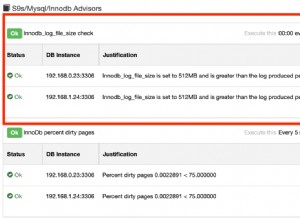Sembra corretto, ma ti stai dimenticando del comportamento asincrono di Javascript :). Quando codifichi questo:
module.exports.getAllTasks = function(){
Task.find().lean().exec(function (err, docs) {
console.log(docs); // returns json
});
}
Puoi vedere la risposta json perché stai usando un console.log istruzione ALL'INTERNO della callback (la funzione anonima che passi a .exec()) Tuttavia, quando digiti:
app.get('/get-all-tasks',function(req,res){
res.setHeader('Content-Type', 'application/json');
console.log(Task.getAllTasks()); //<-- You won't see any data returned
res.json({msg:"Hej, this is a test"}); // returns object
});
Console.log eseguirà getAllTasks() funzione che non restituisce nulla (indefinito) perché la cosa che restituisce davvero i dati che vuoi è ALL'INTERNO della richiamata...
Quindi, per farlo funzionare, avrai bisogno di qualcosa del genere:
module.exports.getAllTasks = function(callback){ // we will pass a function :)
Task.find().lean().exec(function (err, docs) {
console.log(docs); // returns json
callback(docs); // <-- call the function passed as parameter
});
}
E possiamo scrivere:
app.get('/get-all-tasks',function(req,res){
res.setHeader('Content-Type', 'application/json');
Task.getAllTasks(function(docs) {console.log(docs)}); // now this will execute, and when the Task.find().lean().exec(function (err, docs){...} ends it will call the console.log instruction
res.json({msg:"Hej, this is a test"}); // this will be executed BEFORE getAllTasks() ends ;P (because getAllTasks() is asynchronous and will take time to complete)
});




